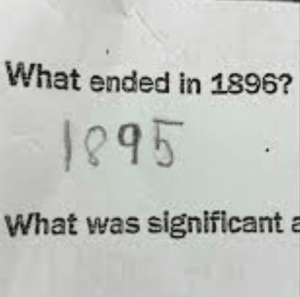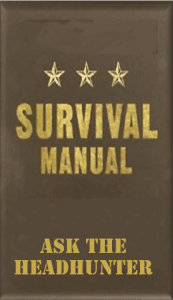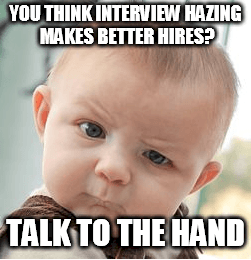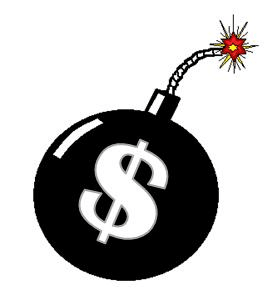In the March 8, 2016 Ask The Headhunter Newsletter, a reader asks how to make failed interviews pay off.
Question
I had a good interview, or so I thought. The manager complimented me on our discussion, and I could tell she was impressed, but I guess I just wasn’t the right fit. I know everyone goes through this. But when you add up all the interviews across a long career, you wonder why. I try to learn something from every such failure, but the time spent just doesn’t seem to be compensated by what managers share after a meeting. Do you have any advice about how to benefit even from interviews that don’t result in a job offer?
 Nick’s Reply
Nick’s Reply
Not every job interview results in an offer of employment, but every interview should provide you with information that helps you land an offer next time. An interview is an investment of time and effort. You should always get a return on that investment — either in the form of an offer, or in the form of useful feedback.
Many employers won’t tell why they rejected you. Indeed, their legal eagles (or hatchlings in the HR department) may have warned managers that they’d get sued for telling you too much. But, if you press, you may get something you can use. Just remember: You don’t want grounds for a lawsuit, you want useful information. An employer owes you that in exchange for your participation in their hiring process.
Here’s how to get truly useful information if you’ve been rejected.
First, make sure you’re getting feedback directly from the manager and members of her team. The most valid information usually comes from the hiring authority and from others who understand the work in question, not from a clerk in HR. (A good HR person might offer you something useful, but it’s usually the manager who can really help you.) So call the boss after your meeting.
Second, don’t ask why they turned you down. (That’s what prompts the legal heebie-jeebies.) Instead, thank the manager for considering you, then shift the discussion to career development.
How to Say It
“I learned a lot from our discussion. Can I ask you for some advice? Someday I want to work in the kind of position I interviewed for. I want to become one of the best people in this field. Can you suggest what I ought to be reading, what kinds of further education or training I might get, and where I should focus myself to develop the right skills? What would you do if you were me, to develop myself professionally?”
Keep your request informal and friendly, and a good manager will advise you. Note that you are not asking why you were rejected. (See Play Hardball With Slowpoke Employers.)
Finally, don’t take “no” for an answer. If you’ve asked diplomatically but a manager ignores your calls or won’t provide honest feedback after a rejection, recognize that you’re dealing with an irresponsible member of your professional community. She has a one-sided view of business. She expects people to be open and honest in interviews, but refuses to be candid herself.
My next suggestion will probably have you scratching your head, but think about it.
E-mail or call the CEO of the company, or the top executive in the department that interviewed you. (Don’t be intimidated — he or she is just another employee of the company.) Politely explain that you interviewed in good faith, and that you expect the same in return.
How to Say It
“I value my reputation as a responsible, forthright [marketer, software engineer, whatever you are]. I hope your company values its reputation as a responsible member of our professional community. I invested many hours in interviews with your team, and I would simply like some honest feedback about my meetings with your company. But no one will call me back. I look forward to hearing from you.”
A good CEO will get the message. A bad one will ignore you. It’s worth finding out how a company you’re interested in is managed, and whether they behave with integrity.
Shocking suggestion, isn’t it — that a top executive would make sure her management team does the right thing. The world has been conditioned to accept bad behavior, so we don’t ask for good behavior. That diminishes the entire business world. My guess is, awkward as such a call or e-mail might seem to you, the CEO will remember you. If the CEO is respectful, it’ll pay off. If the CEO is dismissive, you’re the one who will remember. And you’ll let others know.
After investing hours talking with a company, you should see a return on your investment. But it’s up to you to collect it. Nobody said doing collections is easy, but consider how much you can learn throughout your career by chasing down the value of every interview you do.
The bonus is, after a few of these calls, you’ll have all kinds of good questions to ask employers at the end of your interviews, so you can collect the ROI without having to call anyone later.
A rejection can be delivered in one of two ways: with good faith and respect, or with thoughtless disdain. When you invest in an interview, make sure you get the most out of it. Ask. Learn. (See Loopy feedback failure.)
Do you make sure every interview pays off? We all know employers are lousy about providing useful feedback. I frankly don’t know how they get away without it. How can they be squeezed, without making them explode?
: :


 Today (March 1) we’re joined by some special guests! A big welcome to IT professionals from
Today (March 1) we’re joined by some special guests! A big welcome to IT professionals from 


 If I get this job — and even with help it’s still a big IF, — it will be my last job. The salary and perks will get me through my last 20 years before retirement, and a few years in, I can even move anywhere I like in the world and work remotely. Sweet.
If I get this job — and even with help it’s still a big IF, — it will be my last job. The salary and perks will get me through my last 20 years before retirement, and a few years in, I can even move anywhere I like in the world and work remotely. Sweet.

 I just sent one, after talking to the top dog. I repeated that I am interested in the position and told him of my immediate schedule. More importantly, and motivated by your columns, I told him about some activity of a standards committee that might have a strategic impact on his operations. I said I would be joining the committee, ex officio, by contributing some research I was doing, and I also told him what my input would be if I were working for him.
I just sent one, after talking to the top dog. I repeated that I am interested in the position and told him of my immediate schedule. More importantly, and motivated by your columns, I told him about some activity of a standards committee that might have a strategic impact on his operations. I said I would be joining the committee, ex officio, by contributing some research I was doing, and I also told him what my input would be if I were working for him.

 Contrary to the title of this Q&A, you’re not really afraid your millennial daughter is making a career mistake. You’re just afraid that you’re afraid she is. So I give you credit for starting a candid discussion about this, and for giving your daughter a chance.
Contrary to the title of this Q&A, you’re not really afraid your millennial daughter is making a career mistake. You’re just afraid that you’re afraid she is. So I give you credit for starting a candid discussion about this, and for giving your daughter a chance. Question
Question What are your rules for working with headhunters? Have you been burned?
What are your rules for working with headhunters? Have you been burned?